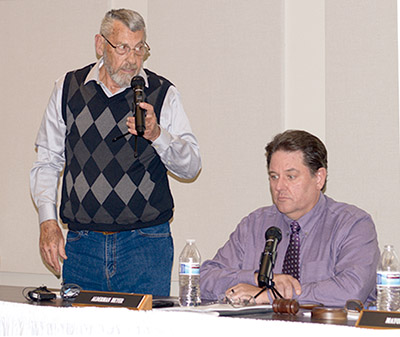Meeting with Jacobs, Meyer changes, saves Knox GP Amendments

“Obviously, I’m glad they’re reconsidering the vote,” Knox County Mayor Glenn Jacobs said after the meeting. “I certainly hope we can work this out. I think everybody wants that.”
“Various Farragut/Knox County residents urged me to vote against the Growth Plan,” Meyer said. “I believe the great opposition is rooted in frustration with Farragut traffic that comes with rapid property development.
“I understand this frustration because I, too, regularly sit in traffic for unacceptable amounts of time,” he added. “I believe we all can agree that high-impact traffic comes from high-density development because we live it everyday. I also understand property owners have the Constitutional right to develop their land according to existing zoning and precedent, a characteristic that distinguishes the United States from countries like China and Cuba.
“In particular, as farmers in rural areas pass their land to their descendants, the descendants have a right to develop the land, which is a fact we must accept. Our goals should not be to deny property owners their Constitutional rights to develop their property because they will. “
Instead, “Our goal should be to control the development in order to mitigate the traffic impact as much as possible,” Meyer said. “The proposed Growth Plan Amendments reduce traffic impact in rural areas by the following changes: No. 1, reducing the number of units per acre from three units to two units, and No. 2 by omitting light industrial use.
“Further, because rural areas border Farragut, these changes allow for a Farragut traffic impact that is lower than currently allowed by the existing growth plan,” he added.
“I commend Vice Mayor (Louise) Povlin for advocating for these changes, as these changes will help preserve rural character and mitigate traffic impact as these properties develop. As I mentioned in last week’s meeting, my concern with the Growth Plan Amendments was that they do not address density in the growth areas that border Farragut.”
For example, “In both the planned growth area and the urban growth boundary, developers could develop a range of densities, including apartments or commercial properties, which have the highest traffic impact of already congested Farragut roads,” Meyer said.
However, “during a cordial and very productive meeting yesterday (Tuesday, April 2), Knox County Mayor Jacobs and staff confirmed their commitment to me to keep density in these growth areas as low as possible, which, in turn, will lead to the least impact on Farragut traffic as possible,” he said. “This commitment to lower density and ongoing collaboration has alleviated my concerns for the Growth Plan Amendments.
“As I previously mentioned since our last meeting, I met with Knox County officials and staff, as well as thought whether, in my opinion, the Growth Policy Plan Amendments are the best interests of the Town. I’ve decided, after much consideration, to change my vote.”
The Board voted 3-0-1 on Meyer’s motion, seconded by Mayor Ron Williams, to rescind the previous vote and place the resolution for the Growth Policy Plan Amendments on the April 11 meeting agenda so it could be renewed or reconsidered.
“That way, everybody can come back next time,” Town attorney Tom Hale said. He explained at the beginning of the meeting that state law required the Board to state its reasons for their objections to the proposed Growth Policy Plan Amendments.
On the other side
Alderman Drew Burnett passed on the motion, with Meyer, Williams and Povlin voting yes. Alderman David White, who left earlier in the meeting, was absent for that vote.
“There’s over a 1,000 acres that can be developed at two units an acre,” Burnette said. “That, alone, is hard to imagine what that does to an already fragile and broken road.
“On top of that it also allows for the possibility of Neighborhood Commercial,” he added. “They would only need to meet one of the three stipulations to be granted a Commercial zone in a rural area … it just drives more traffic, it drives more homes, more development in the area.”
Also, he referred to the county’s transportation plan “that only listed minor improvements. With only minor improvements in that area, it leaves residents in a tough spot for the next 10 to 20 years.”
Burnette said there is a large piece of property along Northshore Drive that “has some parts in rural and some parts in planned growth.” He believes the whole property “should be rural.”
“After the last vote, I’ve spoken with Mayor Jacobs, and the things I hear said and the threats, that’s not the guy that I talked to,” the alderman added. “That means something.
“I’ve lost sleep over this. I’ve had countless nights trying to figure out where I stand, where my people stand.”


